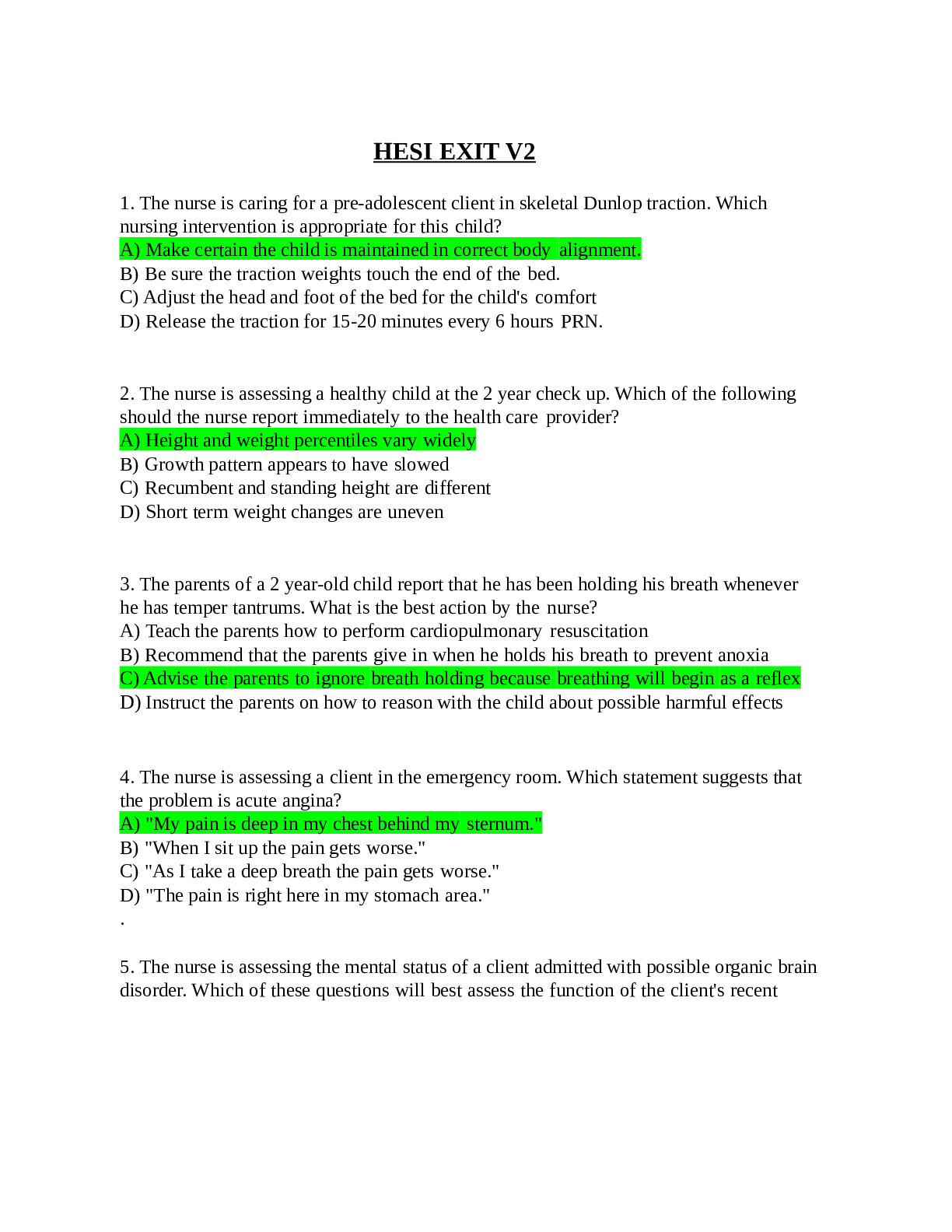All study resources > HESI EXIT V 2 question and answers (Nursing)
HESI EXIT V 2 question and answers
1. The nurse is caring for a pre-adolescent client in skeletal Dunlop traction. Which
nursing intervention is appropriate for this child?
A) Make certain the child is maintained in correct body alignment.
B) Be sure the traction weights touch the end of the bed.
C) Adjust the head and foot of the bed for the child's comfort
D) Release the traction for 15-20 minutes every 6 hours PRN.
2.
...[Show More]
1. The nurse is caring for a pre-adolescent client in skeletal Dunlop traction. Which
nursing intervention is appropriate for this child?
A) Make certain the child is maintained in correct body alignment.
B) Be sure the traction weights touch the end of the bed.
C) Adjust the head and foot of the bed for the child's comfort
D) Release the traction for 15-20 minutes every 6 hours PRN.
2. The nurse is assessing a healthy child at the 2 year check up. Which of the following
should the nurse report immediately to the health care provider?
A) Height and weight percentiles vary widely
B) Growth pattern appears to have slowed
C) Recumbent and standing height are different
D) Short term weight changes are uneven
3. The parents of a 2 year-old child report that he has been holding his breath whenever
he has temper tantrums. What is the best action by the nurse?
A) Teach the parents how to perform cardiopulmonary resuscitation
B) Recommend that the parents give in when he holds his breath to prevent anoxia
C) Advise the parents to ignore breath holding because breathing will begin as a reflex
D) Instruct the parents on how to reason with the child about possible harmful effects
4. The nurse is assessing a client in the emergency room. Which statement suggests that
the problem is acute angina?
A) "My pain is deep in my chest behind my sternum."
B) "When I sit up the pain gets worse."
C) "As I take a deep breath the pain gets worse."
D) "The pain is right here in my stomach area."
.
5. The nurse is assessing the mental status of a client admitted with possible organic brain
disorder. Which of these questions will best assess the function of the client's recent
memory?
A) "Name the year." "What season is this?" (pause for answer after each question)
B) "Subtract 7 from 100 and then subtract 7 from that." (pause for answer) "Now
continue to subtract 7 from the new number."
C) "I am going to say the names of three things and I want you to repeat them after me:
blue, ball, pen."
D) "What is this on my wrist?" (point to your watch) Then ask, "What is the purpose of
it?"
6. In planning care for a 6 month-old infant, what must the nurse provide to assist in the
development of trust?
A) Food
B) Warmth
C) Security
D) Comfort
7. A nurse has just received a medication order which is not legible. Which statement best
reflects assertive communication?
A) "I cannot give this medication as it is written. I have no idea of what you mean."
B) "Would you please clarify what you have written so I am sure I am reading it
correctly?"
C) "I am having difficulty reading your handwriting. It would save me time if you would
be more careful."
D) "Please print in the future so I do not have to spend extra time attempting to read your
writing."
8. What is the most important consideration when teaching parents how to reduce risks in
the home?
A) Age and knowledge level of the parents
B) Proximity to emergency services
C) Number of children in the home
D) Age of children in the home
9. A 35 year-old client with sickle cell crisis is talking on the telephone but stops as the
nurse enters the room to request something for pain. The nurse should
A) Administer a placebo
B) Encourage increased fluid intake
C) Administer the prescribed analgesia
D) Recommend relaxation exercises for pain control
10. While caring for a toddler with croup, which initial sign of croup requires the nurse's
immediate attention?
A) Respiratory rate of 42
B) Lethargy for the past hour
C) Apical pulse of 54
D) Coughing up copious secretions
11. A client is admitted with low T3 and T4 levels and an elevated TSH level. On initial
assessment, the nurse would anticipate which of the following assessment findings?
A) Lethargy
B) Heat intolerance
C) Diarrhea
D) Skin eruptions
12. The emergency room nurse admits a child who experienced a seizure at school. The
father comments that this is the first occurrence, and denies any family history of
epilepsy. What is the best response by the nurse?
A) "Do not worry. Epilepsy can be treated with medications."
B) "The seizure may or may not mean your child has epilepsy."
C) "Since this was the first convulsion, it may not happen again."
D) "Long term treatment will prevent future seizures."
[Show Less]
